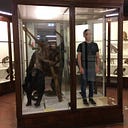In Defence of “Yellow Submarine”
Yellow Submarine sculpture, Festival Gardens, Liverpool, 1984 (Credit: Tyger Who Came To Tea)
On Facebook recently, a friend of mine asked what my favourite album by the The Beatles was. I answered that it is Revolver.
“But…,” the friend replied, disagreeing, “what about ‘Yellow Submarine’?” He finds the song unlistenable.
This my reply, which is far too long for a Facebook post.
I like “Yellow Submarine” for two reasons.
The first reason is the “charm” it shines on the band’s more avant-garde songs. I like “Eleanor Rigby” even more because “Yellow Submarine” was the b-side, “Tomorrow Never Knows” even more because of what it on the same album.
Without that charm — Revolver without “Yellow Submarine” — The Beatles would be something else entirely, somehow more exclusive, a band for the few not the many. This goes beyond luring people in with hits and good tunes: if “Yellow Submarine” is accessible and popular, then “Tomorrow Never Knows” must be too. It is not all too cool for you, or beyond you, you in your provincial town with workaday worries, far from the private members’ clubs where the artsy set allude to things you can only read about. These songs were made for precisely for you. If the album features “Yellow Submarine”, then the aching and the delicacy that is found elsewhere, the vaunted and exquisite skill, can’t be out of place echoing from small speakers in small rooms. If “Yellow Submarine” is for me, for all the lonely people, I suppose, so is the rest.
The second reason I like “Yellow Submarine” is that, perhaps more than any other song they recorded, it has unshackled itself from fashion or taste. It is hummed and sung as widely as anything The Beatles ever did. My young children and their friends know it well, nostalgic even with little to remember. It is telling that my first exposure to The Beatles was on a giant, yellow playground submarine in a public park in Liverpool, or through the animated version in the Yellow Submarine cartoon. For me, The Beatles belonged in the playground and on the television long before they belonged on my turntable.
Although you may not live there anymore, there is a world where all submarines are yellow, and all octopuses have gardens; like much in the popular imagination, it is seen most easily in children’s books and films, but not limited to it. I suspect that, long after we are all gone, and our children and their children are gone too, what will remain of The Beatles, perhaps of the sixties more generally, will be a mother’s hummed introduction to “Yellow Submarine” or, unthinkingly, an illustrator somewhere colouring his creations a certain way.
As The Beatles surely knew, only what is most catchy, the most easily translatable about pop culture, lasts for more than a few generations, and then only in snippets, disassociated from what made it specific. What now, for example, remains of the singers of the pre-electrical era but some vague sense of their earnestness or their novelty, parodied or adopted unconsciously? What will remain of Frank Sinatra, a complex man with a complex career, after his ongoing distillation to a few bars of “My Way” is complete? What remains of our great-great grandparents but the occasional comforting sadness we feel in a particular place, for unremembered reasons, or an unwitting act of devotion carried out unacknowledged, or a few notes of melody which mean something now because they meant something then?
Although it is difficult to predict what will survive down the years but a reasonable guess is that the songs young children can already sing may linger the longest. Perhaps, in our grander moments, we would like some better song to survive, but the surest way that music can last is as a hymn or nursery rhyme. “Yellow Submarine” is neither “Eleanor Rigby” nor “Tomorrow Never Knows”, but it might be “Ring a Ring o’ Roses” or “Three Blind Mice” or a chorus of “I Do Like To Be Beside The Seaside” whistled smilingly into a bracing wind.
In one hundred years, two hundred, who will much care about whether a song did or did not appear innovative in a decade that will become less spectacular with age or, worse, how it appeared fifty years later, on the internet?
To be irritated by it will miss the point; it will mean nothing next to what little our ancestors can remember of the songs their grandparents once told them that their own grandparents sang, long ago. “Yellow Submarine” has a better chance than most songs of being remembered this way, riddled with nostalgia for lives yet to be lived. If this is what my ancestors will sing of the music I love, absent-minded and sentimental in their unimaginable futures, then I love “Yellow Submarine” too.
